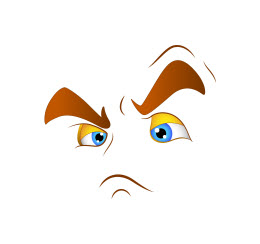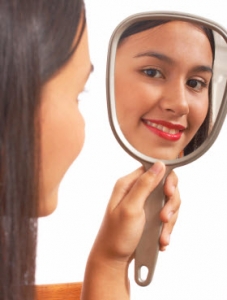
A friend of mine owns a bakery and café. Her cupcakes are scrumptious, her Caprese sandwich melts in your mouth. Clients drive miles for one of her macaroons.
Her baked goods are legendary; the problem is her facial expressions.
In online reviews customers rave about the food, but several comment that the owner could be “friendlier.” Reading closely you can discern that many of the commentators didn’t speak to the owner, they observed her working in the back, with what according to one reviewer a “grim” expression on her face.
On the one hand, it has to be hugely frustrating for the owner, who is literally slaving over a hot stove to discover that even though her actual product is baked goods, clients are critiquing her facial expressions.
Yet this is the reality of the human condition. Humans are called the comparing creatures because we’re always assessing each other. We can’t help it; it’s instinctual. Much of it is done unconsciously. We evaluate experiences on two levels. One is the physical plane. How does the food taste? Was the place clean?
The other way we evaluate experiences is emotionally. How does it feel to us? What was the emotional undercurrent of the interaction? We’re less conscious of these evaluations, yet we’re always making them. We subconsciously assess how other people are reacting to us. That’s where facial expressions come in. When someone grimaces, smirks, or looks bored, we unconsciously evaluate it, and respond in kind.
If you’ve ever watched American Idol, or any of the other similar shows, you’ll see the experts coaching performers on their facial expressions. That’s because the veteran performers know that the audience responds to your looks as much as they do your voice.
Unfortunately, for my friend who owns the bakery, she may be grimacing because she’s concentrating on testing out a new recipe. Yet some of her customers are reading her furrowed brow and frown as a lack of hospitality.
Now, thanks to social media, they can broadcast their observations. What might have once been unconscious is now public because the Internet gives people the opportunity to consciously assess and broadcast their experiences.
There’s a lesson here for everyone, no matter what your profession.
The way people experience you has less to do with your content than it does your overall affect, which includes your facial expressions. A doctor can be brilliant, but if she walks into the room  looking down and frowning, the patient won’t be as likely to speak openly. Your presentation can include the most accurate data, but if you don’t make eye contact with the audience, they won’t remember it. Facial expressions are comprised of a million little micro movements, that we as humans are trained from birth to understand.
looking down and frowning, the patient won’t be as likely to speak openly. Your presentation can include the most accurate data, but if you don’t make eye contact with the audience, they won’t remember it. Facial expressions are comprised of a million little micro movements, that we as humans are trained from birth to understand.
People often rail at the unjustness of it. Is style more relevant than substance? Do facial expressions matter more than brains? No, they don’t, but negative facial expressions can mask expertise.
If the cupcakes are bad, it doesn’t matter how happy you are to serve them, they’ll still be bad. But if your cupcakes are fabulous, a pleasant expression on the server’s face contributes to the experience.
If you’re not sure what your face is saying ask the people around you. If you don’t like what you hear, it’s worth a little practice time in front of the mirror to change things. Your face communicates your feelings, make sure it’s saying something accurate.